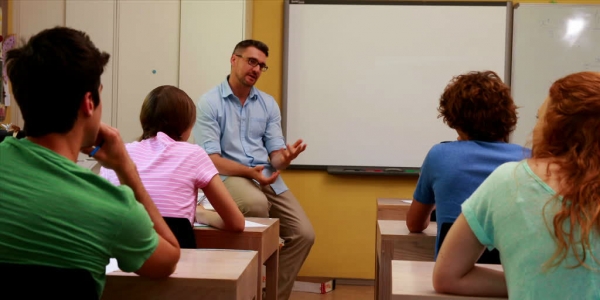One of my students recently passed her IELTS exam on the first attempt. When she first came to me, she was nervous about speaking and had quite a low level. She had the motivation to learn (and a huge need to pass her exam) but didn’t know how to apply this to her learning. In addition, she’s a very busy person and struggled to find time to study English.
She came to me asking for two lessons per week. In the time we had I knew that she needed to do much more than this. So, we worked together to come up with a plan of action of what to study outside the lessons. We also went through different time management techniques to help her find the time to learn, and delved into the world of personal development to help her build confidence with her speaking and to overcome some limiting beliefs that she had.
I feel very confident when I say that if my student had gone to one of her local language schools, she wouldn’t have passed the exam.
My Experience Teaching in Language Schools
Working in different language schools always felt restrictive, especially in the ones where they had very particular methods that they wanted me to follow.
I think most of us question traditional ways of teaching when we first start. For me, at the heart was the following question:
Are my students really going to make good progress by coming to class two times per week and doing the standard homework?
I mainly taught classes of between six and twelve students, and the only contact we had was in the classroom. I wanted to help them in more meaningful ways, but our time together was limited and at first I didn’t have the necessarily knowledge or experience. Only the students who took responsibility for their learning were the ones who made any real progress.
Becoming a Language Coach
In addition to teaching in language schools in Spain, I created my first site that offered lessons over Skype and gave private lessons face-to-face in Bilbao and Valencia. This gave me room to experiment a little and try different things. I didn’t have a lot of experience at the time, so I mainly stuck to going through a course book, giving homework, and focused on conversational English.
It’s been six years since I started giving private lessons, and the way I “teach” has evolved dramatically over that time.
Instead of seeing myself as a teacher, I now call myself a language coach. I use the knowledge I have of personal development and time management to help my students make the necessary changes.
I know what works when it comes to learning English and what needs to be done. A big part of my job is to work with students so that they:
- Accept the level they have.
- Know that it’s okay to make mistakes.
- Know what it takes to reach their goals.
- Have the belief that they can achieve these goals.
- Have a clear plan of action.
- Use the time we have together in the most effective way possible.
I can’t “teach” my students English; a language isn’t learned like this. But, what I can do is create engaging and relevant lessons, inspire my students, and show them how they can effectively make the progress that they desire.
Let’s now look at two areas from the list above.
Expectations
One of the biggest problems that needs solving for language learners is that of expectations: the majority of learners either think (or are in denial about) what needs to be done to reach their goals. They have been sold on the idea that taking a course is going to dramatically help them. Or when that fails, that buying a new product that promises results in 7 days will mean they’ll be speaking like a native in a week.
When I go through this with my students, the majority know deep down that it takes more than that, while others have no idea of what actually needs to be done to gain fluency.
Beliefs
Once learners go through the traditional and “7 day” methods and see little or no progress, then doubts start to creep in. I often hear English learners say:
- I will never be able to speak well.
- Others must have a language learning gene.
- People will judge me when I make mistakes.
These are all limiting beliefs that stop our students from making progress, and as with all beliefs, they can be changed. We can do this by getting the heart of what is holding them back, and change these beliefs to help our students reach their full potential.
“Man is made by his belief. As he believes, so he is.” – Johann Wolfgang von Goethe
If I had the opportunity to teach my group lessons in Spain again, I would do things differently. It would present more of a challenge than my one-to-one lessons, but I would go that extra mile to help them make progress by using the methods and techniques that I speak about in this post, and use email to help me communicate this with everyone.
The majority of language learners need more than just a teacher. They need a language coach.
by Jack







